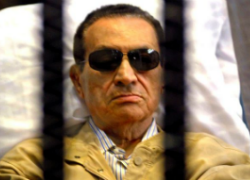
On June 2nd, an Egyptian court sentenced deposed leader Hosni Mubarak to life in prison over the killing of innocent protesters in the Egyptian uprising of 2011. Mubarak is the first former leader in the region to be tried in person in the aftermath of the Arab Spring, marking an ignominious end to a thirty-year reign. Mr. Mubarak faced a potential death sentence for the failure of the state to stop the killing of almost 850 demonstrators. Instead both Mubarak and his ex-Interior Minister, Habib el-Adly, face a life behind bars.
The Mubarak verdict was initially greeted with great celebration, especially among the families of the victims. “I am so happy – this is the greatest happiness I have ever felt,” said Rada Mohamed Mabrouk, a 60-year-old Egyptian. “The martyrs are all of our children.” Sentencing Judge Ahmed Refaat described the end of “thirty years of darkness.”
But the mood quickly turned angry, with scuffles even breaking out right in the courtroom. Many denounced the court’s failure to render a death sentence, while others decried the acquittal of several high level leaders more closely linked to the killings, and the acquittal of Mubarak’s two sons on corruption charges. “It’s all an act. It is a show. It is a provocation,” said Alaa Hamam, one of thousands of protestors who took to Tahrir Square. “The verdict means that the head of the regime and the minister of interior are the only ones who have fallen, but the rest of the entire regime remains,” added the Muslim Brotherhood in a prepared statement.
The Mubarak verdict comes on the eve of presidential elections in Egypt after over a year of military rule following Mubarak’s ouster. Judging by the public reaction, the former leader’s conviction has not ushered in stability in the lead-up to the June 16-17 election, which pits Mubarak’s former prime minister, Ahmed Shafiq, against Mubarak’s rival, Mohammed Morsi, of the Muslim Brotherhood. The widespread anger and chaos may not bode well for Shafiq because of his close previous ties to Mubarak.
In addition to Egypt’s uncertain political future, many fear that the verdict is subject to reversal. Critics of the trial have described the investigations as “hasty and sloppy,” resulting in suspect “patchwork” evidence. Additionally, because prosecutors made no showing that Mubarak directly ordered any killings, the Egyptian court convicted Mubarak of “accessory to murder” for his failure to stop the killing of protestors while in power. Lawyers and political leaders have noted that such a rationale likely cannot support a murder conviction under international law and may be “doomed to reversal.”


